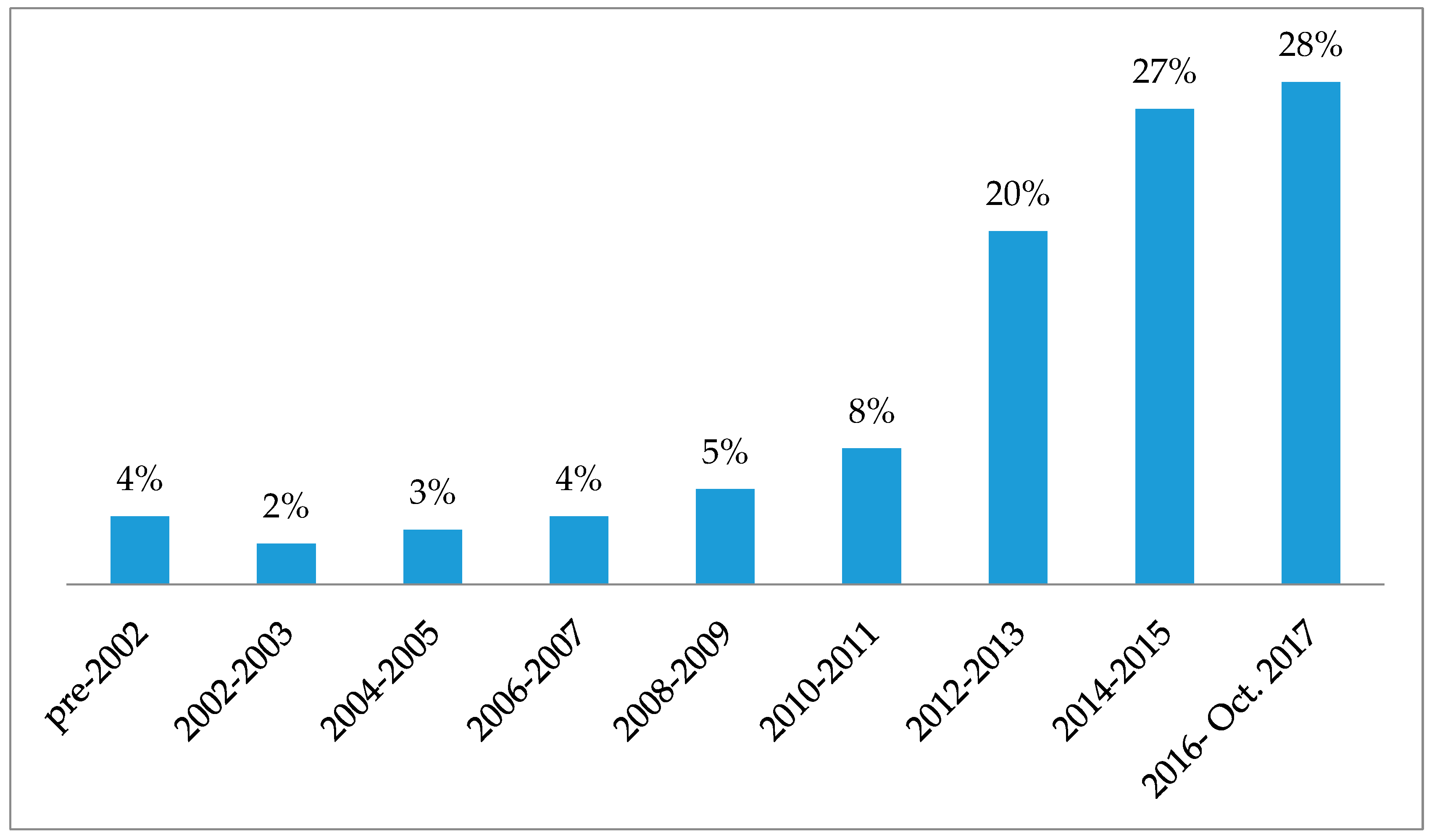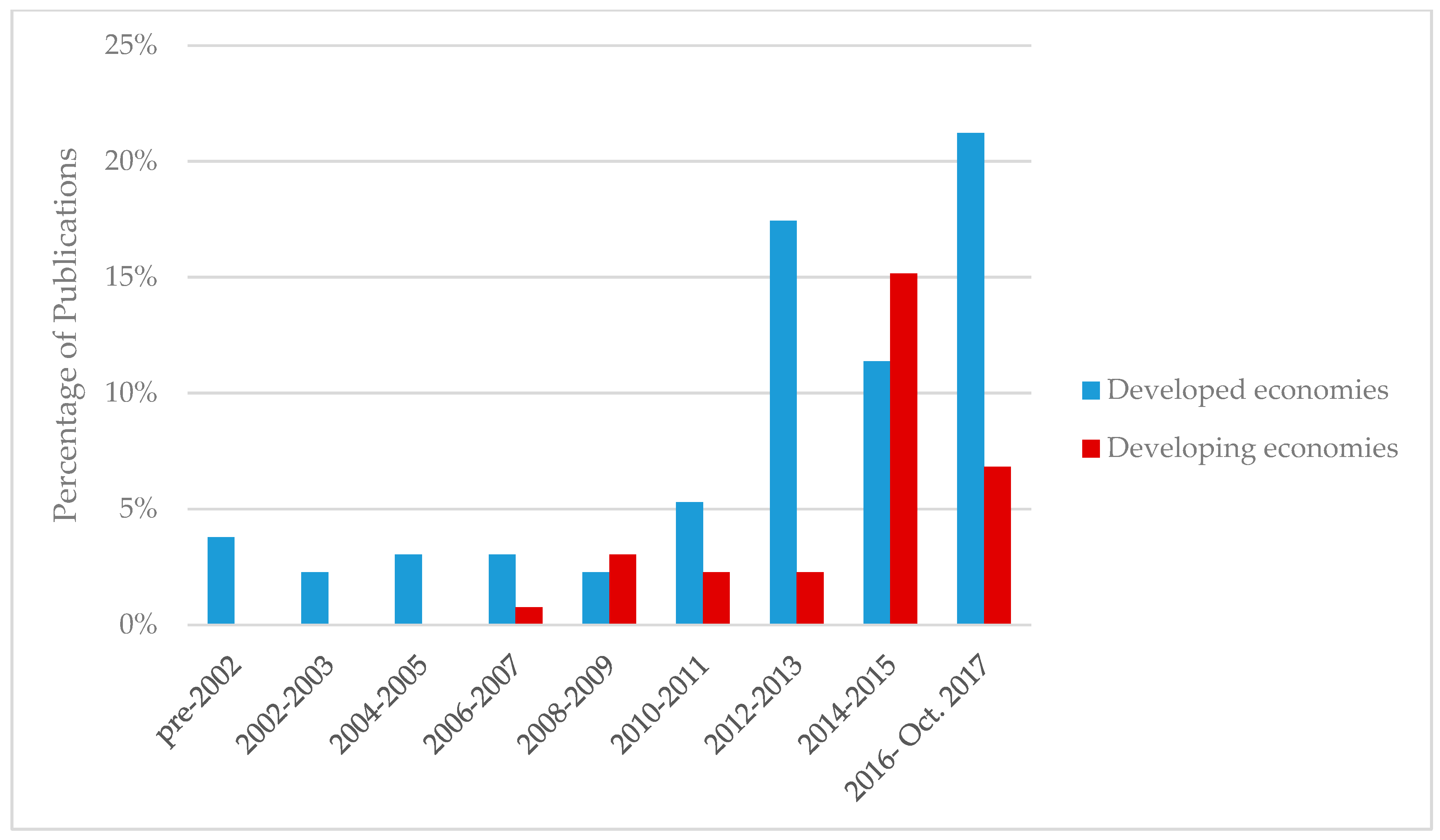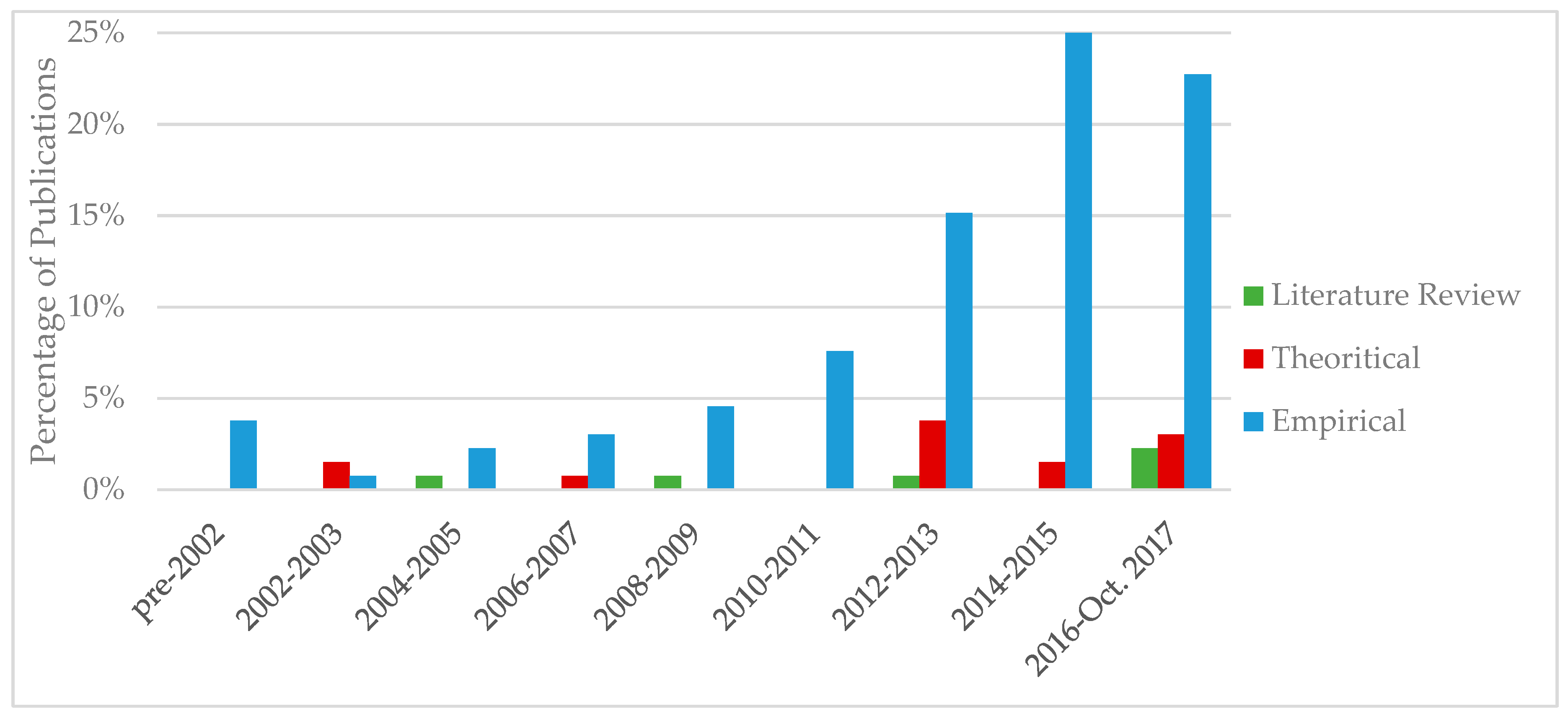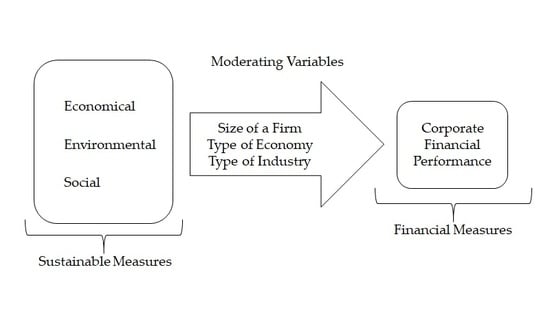| Leonidou, Constantinos N.; Katsikeas, Constantine S.; Morgan, Neil A. | “Greening” the marketing mix: do firms do it and does it pay off? | 2013 | ROA |
| Wiengarten, Frank; Lo, Chris K.; Lam, Jessie Y. | “How does Sustainability Leadership Affect Firm Performance? The Choices Associated with Appointing a Chief Officer of Corporate Social Responsibility” | 2017 | ROA |
| Golicic, Susan L.; Smith, Carlo D. | A Meta-Analysis of Environmentally Sustainable Supply Chain Management Practices and Firm Performance | 2013 | - |
| Morali, Oguz; Searcy, Cory | A Review of Sustainable Supply Chain Management Practices in Canada | 2013 | - |
| Rettab, Belaid; Brik, Anis Ben; Mellahi, Kamel | A Study of Management Perceptions of the Impact of Corporate Social Responsibility on Organisational Performance in Emerging Economies: The Case of Dubai | 2009 | ROA, ROI, Sales Growth |
| Shen, Chung-hua; Chang, Yuan | Ambition Versus Conscience, Does Corporate Social Responsibility Pay off? The Application of Matching Methods | 2009 | ROA, ROE, PTI, RGM, EPS |
| Jacobs, Brian W.; Singhal, Vinod R.; Subramanian, Ravi | An empirical investigation of environmental performance and the market value of the firm | 2010 | Return of Stock |
| Xiao, Yuchao; Faff, Robert; Gharghori, Philip; Lee, Darren | An Empirical Study of the World Price of Sustainability | 2013 | Market Return |
| Verbeeten, Frank H. M.; Gamerschlag, Ramin; Möller, Klaus | Are CSR disclosures relevant for investors? Empirical evidence from Germany | 2016 | Share price, Return Per Share RET |
| Gallego-Álvarez, Isabel; Prado-Lorenzo, José-Manuel; Rodríguez-Domínguez, Luis; García-Sánchez, Isabel-María | Are social and environmental practices a marketing tool? | 2010 | Market Value, Capital |
| Dixon-Fowler, Heather; Slater, Daniel J.; Johnson, Jonathan L.; Ellstrand, Alan E.; Romi, Andrea M. | Beyond “Does it Pay to be Green?” A Meta-Analysis of Moderators of the CEP—CFP Relationship | 2013 | ROA, Market Share |
| Hahn, Tobias; Figge, Frank | Beyond the Bounded Instrumentality in Current Corporate Sustainability Research: Toward an Inclusive Notion of Profitability | 2011 | Capital Efficiency, Market Efficiency, Total Sales |
| Haffar, Merriam; Searcy, Cory | Classification of Trade-offs Encountered in the Practice of Corporate Sustainability | 2017 | - |
| Surroca, Jordi; Tribó, Josep A.; Waddock, Sandra | Corporate responsibility and financial performance: the role of intangible resources | 2010 | Tobin’s Q |
| Harrison, Jeffrey S.; Berman, Shawn L. | Corporate Social Performance and Economic Cycles | 2016 | GDP |
| Guiral, Andrés | Corporate Social Performance, Innovation Intensity, and Financial Performance: Evidence from Lending Decisions | 2012 | - |
| Kevin Huang, Shihping; Yang, Chih-Lung | Corporate social performance: why it matters? Case of Taiwan | 2014 | ROA, ROE |
| Kang, Hsin-hong; Liu, Shu-bing | Corporate social responsibility and corporate performance: a quantile regression approach | 2014 | ROA, ROE, Pre Tax Income to Net Sales PTI, Gross Profit to Net Sales (GPS), EPS |
| Simionescu, Liliana Nicoleta; Gherghina, Stefan Cristian | Corporate social responsibility and corporate performance: empirical evidence from a panel of the Bucharest Stock Exchange listed companies | 2014 | ROA, ROE, ROS |
| Balabanis, George; Phillips, Hugh C.; Lyall, Jonathan | Corporate social responsibility and economic performance in the top British companies: are they linked? | 1998 | ROE, ROCE, Gross Profit to Sales Ratio (GPS) |
| Cochran, Philip L.; Wood, Robert A. | Corporate social responsibility and financial performance | 1984 | Operating Earnings to Assets Ratio, Operating Earnings to Sales Ratio, Excess Market Valuation |
| Lech, Aleksandra | Corporate Social Responsibility and Financial Performance. Theoretical and Empirical Aspects | 2013 | ROA, ROE |
| Karagiorgos, Theofanis | Corporate Social Responsibility and Financial Performance: An Empirical Analysis on Greek Companies | 2010 | Stock Return |
| McGuire, Jean B.; Sundgren, Alison; Schneeweis, Thomas | Corporate Social Responsibility and Firm Financial Performance | 1988 | ROA, Total Assets, Sales Growth, Asset Growth, Operating Income Growth |
| Bai, Xuan; Chang, Jeanine | Corporate social responsibility and firm performance: The mediating role of marketing competence and the moderating role of market environment | 2015 | Growth Rate, ROI, Overall Profitability |
| Gregory, Alan; Tharyan, Rajesh; Whittaker, Julie | Corporate Social Responsibility and Firm Value: Disaggregating the Effects on Cash Flow, Risk and Growth | 2014 | Book Value Per Share (BVPS), Net Income Per Share (NIPS), Long Term Debt, Total Asset, Sales |
| Chang, Yuan; Shen, Chung-Hua | Corporate Social Responsibility and Profitability—Cost of Debt as the Mediator | 2014 | ROA |
| Lizhen Chen, lzhchen ujs edu cn; Marfo, Emmanuel Opoku kwench hotmail com; Hu Xuhua, xuhuahu com | Corporate Social Responsibility behavior: Impact on Firm’s Financial Performance in an information technology driven society | 2016 | ROA, Stock Return Rate |
| Fernández-gago, Roberto; Cabeza-garcía, Laura; Nieto, Mariano | Corporate social responsibility, board of directors, and firm performance: an analysis of their relationships | 2016 | Firm Value |
| Zhu, Yan; Sun, Li-yun; Leung, Alicia S.; M | Corporate social responsibility, firm reputation, and firm performance: The role of ethical leadership | 2014 | ROE, ROI, ROS |
| Vicente Lima, Crisóstomo; Fátima de Souza, Freire; Felipe Cortes de, Vasconcellos | Corporate social responsibility, firm value and financial performance in Brazil | 2011 | Tobin’s Q, ROA, ROE |
| Przychodzen, Justyna; Przychodzen, Wojciech | Corporate sustainability and shareholder wealth | 2013 | Sustainable Growth Rate |
| Venkatraman, Sitalakshmi; Nayak, Raveendranath Ravi | Corporate sustainability: an IS approach for integrating triple bottom line elements | 2015 | Top dividends to shareholders, Business profitability, Return on average capital employed, Meeting tax obligations, Debt/Equity ratio |
| Hart, Stuart L.; Milstein, Mark B. | Creating sustainable value | 2003 | - |
| Porter, Terry; Miles, Patti | CSR Longevity: Evidence from Long-Term Practices in Large Corporations | 2013 | EBIT, EBI, Return on Pretax Income |
| Wang, Chung-Jen | Do ethical and sustainable practices matter? Effects of corporate citizenship on business performance in the hospitality industry | 2014 | ROI, Profit Growth |
| Rodgers, Waymond; Choy, Hiu Lam; Guiral, Andrés | Do Investors Value a Firm’s Commitment to Social Activities? | 2013 | Tobin’s Q, ROA, Financial Leverage, Liquidity Measure |
| Cheung, Yan-Leung; Connelly, J. T.; Jiang, Ping; Limpaphayom, Piman | Does Corporate Governance Predict Future Performance? Evidence from Hong Kong | 2011 | Tobin’s Q, Market to Book Ratio |
| Mishra, Supriti; Suar, Damodar | Does Corporate Social Responsibility Influence Firm Performance of Indian Companies? | 2010 | ROA |
| Hou, Mingjun; Liu, Heng; Fan, Peihua; Wei, Zelong | Does CSR practice pay off in East Asian firms? A meta-analytic investigation | 2016 | ROA, ROE, ROI, Profit Growth, Return of Equity, Cash Flow, Sales Growth, Tobin’s Q, Market Share, Market to Book, Stock Market Returns, Market Share Growth, Export Growth |
| Albertini, Elisabeth | Does Environmental Management Improve Financial Performance? A Meta-Analytical Review | 2013 | ROA, ROE, ROI, ROS, EPS, Tobin’s Q |
| Chien, Chin-Chen; Peng, Chih-Wei | Does going green pay off in the long run? | 2012 | ROE, ROA, EPS, Cash Flow to Total Assets (CFA) |
| Brammer, Stephen; Millington, Andrew | Does It Pay to Be Different? An Analysis of the Relationship between Corporate Social and Financial Performance | 2008 | Market Performance (share price growth plus dividend), Risk adjusted market performance (RAMP) (using government bonds returns as risk free) |
| Thornton, Ladonna M.; Autry, Chad W.; Gligor, David M.; Brik, Anis Ben | Does Socially Responsible Supplier Selection Pay Off for Customer Firms? A Cross-Cultural Comparison | 2013 | Relative Sales Revenue, Sales Growth, Market Share |
| Wahba, Hayam | Does the market value corporate environmental responsibility? An empirical examination | 2008 | Tobin’s Q |
| Chernev, Alexander; Blair, Sean | Doing Well by Doing Good: The Benevolent Halo of Corporate Social Responsibility | 2015 | - |
| Jia, Ming; Zhang, Zhe | Donating Money to Get Money: The Role of Corporate Philanthropy in Stakeholder Reactions to IPOs | 2014 | IPO agents and financing costs (Underwriter prestige, VC-backed shareholding, ration of IPO cost to financing scale), Issue market valuation premium, Retail market valuatin premium |
| Delmas, Magali A.; Nairn-Birch, Nicholas; Lim, Jinghui | Dynamics of Environmental and Financial Performance: The Case of Greenhouse Gas Emissions | 2015 | ROA, Tobin’s Q |
| Van de Velde, Eveline; Vermeir, Wim; Corten, Filip | Finance and accounting: Corporate social responsibility and financial performance | 2005 | Fama and French |
| Scholtens, Bert | Finance as a Driver of Corporate Social Responsibility | 2006 | - |
| Revelli, Christophe; Viviani, Jean-Laurent | Financial performance of socially responsible investing (SRI): what have we learned? A meta-analysis | 2015 | Return of Stock |
| Hull, Clyde Eirikur; Rothenberg, Sandra | Firm performance: the interactions of corporate social performance with innovation and industry differentiation | 2008 | ROA |
| Aguilera-Caracuel, Javier; Ortiz-de-Mandojana, Natalia | Green Innovation and Financial Performance: An Institutional Approach | 2013 | ROA |
| Molina-Azorín, José F.; Claver-Cortés, Enrique; López-Gamero, Maria D.; Tarí, Juan J. | Green management and financial performance: a literature review | 2009 | - |
| García-Sánchez, Isabel-María; Prado-Lorenzo, José-Manuel | Greenhouse gas emission practices and financial performance | 2012 | ROA, Market to Book (MtoB) |
| Nguyen, Dung K.; Slater, Stanley F. | Hitting the sustainability sweet spot: having it all | 2010 | ROA, Revenue Growth Rate, Share Value Appreciation Rate |
| Hyoung Koo, Moon; Byoung Kwon, Choi | How an organization’s ethical climate contributes to customer satisfaction and financial performance | 2014 | ROI |
| Wei, Yu-chen; Lin, Carol Yeh-yun | How can Corporate Social Responsibility Lead to Firm Performance? A Longitudinal Study in Taiwan | 2015 | ROA, Productivity (sales per employee) |
| Tang, Zhi; Hull, Clyde Eiríkur; Rothenberg, Sandra | How Corporate Social Responsibility Engagement Strategy Moderates the CSR-Financial Performance Relationship | 2012 | ROA |
| Saeidi, Sayedeh Parastoo; Sofian, Saudah; Saeidi, Parvaneh; Saeidi, Sayyedeh Parisa; Saaeidi, Seyyed Alireza | How does corporate social responsibility contribute to firm financial performance? The mediating role of competitive advantage, reputation, and customer satisfaction | 2015 | ROA, ROE, ROI, ROS, Market Share Growth, Growth in Sales |
| Koo, Chulmo; Chung, Namho; Ryoo, Sung Yul | How does ecological responsibility affect manufacturing firms’ environmental and economic performance? | 2014 | Decreased Costs |
| Lourenço, Isabel Costa; Branco, Manuel Castelo; Curto, José Dias; Eugénio, Teresa | How Does the Market Value Corporate Sustainability Performance? | 2012 | Market Value of Equity, Book Value of Equity, Net Operating Income |
| Jia, Ming; Zhang, Zhe | How Does the Stock Market Value Corporate Social Performance? When Behavioral Theories Interact with Stakeholder Theory | 2014 | Stock Return |
| Goyal, Praveen; Rahman, Zillur; Kazmi, Absar Ahmad | Identification and prioritization of corporate sustainability practices using analytical hierarchy process | 2015 | - |
| Molla, Alemayehu | Identifying IT sustainability performance drivers: Instrument development and validation | 2013 | - |
| Murtaza, Iqra Ali; Akhtar, Naeem; Ijaz, Aqsa; Sadiqa, Ayesha | Impact of Corporate Social Responsibility on Firm Financial Performance: A Case Study of Pakistan | 2014 | ROA, ROE, EPS |
| Valmohammadi, Changiz | Impact of corporate social responsibility practices on organizational performance: an ISO 26000 perspective | 2014 | ROI, Sales Growth |
| Watson, Kevin; Klingenberg, Beate; Polito, Tony; Geurts, Tom G. | Impact of environmental management system implementation on financial performance: A comparison of two corporate strategies | 2004 | ROA, Profit Margin, Operating Margin, Price to Earnings Ratio, Market to Book Ratio |
| Garg, Priyanka | Impact of Sustainability Reporting on Firm Performance of Companies in India | 2015 | ROA, Tobin’s Q |
| Shank, Todd M. PhD; Shockey, Benjamin M. B. A. | Investment strategies when selecting sustainable firms | 2016 | Return (risk related) |
| Hsu, Feng Jui; Chen, Yu-Cheng | Is a firm’s financial risk associated with corporate social responsibility? | 2015 | - |
| Shih-Fang, Lo; Sheu, Her-Jiun | Is Corporate Sustainability a Value-Increasing Strategy for Business? | 2007 | Tobin’s Q |
| Cegarra-Navarro, Juan-Gabriel; Reverte, Carmelo; Gómez-Melero, Eduardo; Wensley, Anthony K. P. | Linking social and economic responsibilities with financial performance: The role of innovation | 2016 | ROE, Sales Growth, ROA and Market Share, Before-Tax Income |
| Endrikat, Jan; Guenther, Edeltraud; Hoppe, Holger | Making sense of conflicting empirical findings: A meta-analytic review of the relationship between corporate environmental and financial performance | 2014 | - |
| Kiessling, Timothy; Isaksson, Lars; Yasar, Burze | Market Orientation and CSR: Performance Implications | 2016 | ROA |
| Endrikat, Jan | Market Reactions to Corporate Environmental Performance Related Events: A Meta-analytic Consolidation of the Empirical Evidence | 2016 | - |
| de Souza Cunha, Felipe Arias Fogliano; Samanez, Carlos Patricio | Performance Analysis of Sustainable Investments in the Brazilian Stock Market: A Study About the Corporate Sustainability Index (ISE) | 2013 | Return (risk related) |
| Tippayawong, K. Y.; Tiwaratreewit, T.; Sopadang, A. | Positive Influence of Green Supply Chain Operations on Thai Electronic Firms’ Financial Performance | 2015 | ROA, Inventory Turnover Ratio, Operating Cost Ratio, Net Profit Margin, Asset Turnover Ratio |
| Torugsa, Nuttaneeya Ann; O’Donohue, Wayne; Hecker, Rob | Proactive CSR: An Empirical Analysis of the Role of its Economic, Social and Environmental Dimensions on the Association between Capabilities and Performance | 2013 | ROA, Net Profits to Sales, Liquidity |
| Nakao, Yuriko; Amano, Akihiro; Matsumura, Kanichiro; Genba, Kiminori; Nakano, Makiko | Relationship between environmental performance and financial performance: an empirical analysis of Japanese corporations | 2007 | ROA, EPS, Tobin’s Q |
| Martínez-Ferrero, Jennifer; Frías-Aceituno, José Valeriano | Relationship Between Sustainable Development and Financial Performance: International Empirical Research | 2015 | Market Value, Book Value, Equity, Net Operating Income |
| Venkatraman, Sitalakshmi; Nayak, Raveendranath Ravi | Relationships among triple bottom line elements | 2015 | - |
| Robinson, Michael; Kleffner, Anne; Bertels, Stephanie | Signaling Sustainability Leadership: Empirical Evidence of the Value of DJSI Membership | 2011 | Cumulative Abnormal Return (CAR) |
| Wang, Taiyuan; Bansal, Pratima | Social responsibility in new ventures: profiting from a long-term orientation | 2012 | ROA, ROE, ROS, Sales Level, Market Share, Sales Growth, Cash Flow, Ability to fund business growth from profits, Overall firm performance/success |
| Quazi, Ali; Richardson, Alice | Sources of variation in linking corporate social responsibility and financial performance | 2012 | ROA, ROE, ROI, Market Return, Market Valuation, Stock Returns, Share Price, EPS, Survey Measures |
| Yu, Minna; Zhao, Ronald | Sustainability and firm valuation: an international investigation | 2015 | Tobin’s Q |
| Ameer, Rashid; Othman, Radiah | Sustainability Practices and Corporate Financial Performance: A Study Based on the Top Global Corporations | 2012 | ROA, Sales Growth, Profit Befor Tax (PBT), Cash Flow from Operating Activities (CFO) |
| Movassaghi, Hormoz; Bramhandkar, Alka | Sustainability Strategies of Leading Global Firms and Their Financial Performance: A Comparative Case Based Analysis | 2012 | ROA, ROE, EPS, Net Profit Margin, Book Value, Market Value |
| López, M. Victoria; Garcia, Arminda; Rodriguez, Lazaro | Sustainable Development and Corporate Performance: A Study Based on the Dow Jones Sustainability Index | 2007 | ROA, ROE, Profit Before Tax (PBT), Revenue, Capital, Profit Margin, Cost of Capital |
| Salzmann, Oliver; Ionescu-somers, Aileen; Steger, Ulrich | The Business Case for Corporate Sustainability: Literature Review and Research Options | 2005 | - |
| Simpson, Soni; Fischer, Bruce D.; Rohde, Matthew | The Conscious Capitalism Philosophy Pay Off: A Qualitative and Financial Analysis of Conscious Capitalism Corporations | 2013 | Stock Price, Compound Annual Growth Rate |
| Griffin, Jennifer J.; Mahon, John F. | The corporate social performance and corporate financial performance debate: Twenty-five years of incomparable research | 1997 | ROA, ROE, ROS, Total Assets, Asset Age |
| Waddock, Sandra A.; Graves, Samuel B. | The Corporate Social Performance financial Performance Link | 1997 | ROA, ROE, ROS |
| Moneva, Jose M.; Rivera-Lirio, Juana M.; Muñoz-Torres, María J. | The corporate stakeholder commitment and social and financial performance | 2007 | ROA, Return on Shareholder Fund |
| Lee, Sunghee; Jung, Heungjun | The effects of corporate social responsibility on profitability | 2016 | ROA |
| Nor, Norhasimah Md; Bahari, Norhabibi Aishah Shaiful; Adnan, Nor Amiera; Kamal, Sheh Muhammad Qamarul Ariffin Sheh; Ali, Inaliah Mohd | The Effects of Environmental Disclosure on Financial Performance in Malaysia | 2016 | ROA, ROE, EPS, Profit Margin |
| Chang, Dong-shang; Kuo, Li-chin Regina | The effects of sustainable development on firms’ financial performance - an empirical approach | 2008 | ROA, ROE, ROS |
| Isidro, Helena; Sobral, Márcia | The Effects of Women on Corporate Boards on Firm Value, Financial Performance, and Ethical and Social Compliance | 2015 | ROA, ROS, Tobin’s Q |
| Oikonomou, Ioannis; Brooks, Chris; Pavelin, Stephen | The Financial Effects of Uniform and Mixed Corporate Social Performance | 2014 | Book-Value to Market-Value Ratio |
| Chetty, Sukanya; Naidoo, Rebekah; Seetharam, Yudhvir | The Impact of Corporate Social Responsibility on Firms’ Financial Performance in South Africa | 2015 | ROA, ROE, EPS, Stock Returns |
| Feng, Taiwen; Wang, Dan | The Influence of Environmental Management Systems on Financial Performance: A Moderated-Mediation Analysis | 2016 | ROA, ROI, ROS, Net Profit Margin, Growth in Sales, Growth in Profit, Growth in Market Share |
| Singal, Manisha | The Link between Firm Financial Performance and Investment in Sustainability Initiatives | 2014 | Credit Rating |
| Schaltegger, Stefan; Synnestvedt, Terje | The link between ‘green’ and economic success: Environmental management as the crucial trigger between environmental and economic performance | 2002 | - |
| Wu, Junjie; Lodorfos, George; Dean, Aftab; Gioulmpaxiotis, Georgios | The Market Performance of Socially Responsible Investment during Periods of the Economic Cycle—Illustrated Using the Case of FTSE | 2017 | Share Price |
| Al-Tuwaijri, Sulaiman A.; Christensen, Theodore E.; Hughes, K. E. | The relations among environmental disclosure, environmental performance, and economic performance: a simultaneous equations approach | 2004 | Stock Return |
| Maletic, Matjaz; Maletic, Damjan; Dahlgaard, Jens J.; Dahlgaard-Park, Su Mi; Gomiscek, Bostjan | The Relationship between Sustainability- Oriented Innovation Practices and Organizational Performance: Empirical Evidence from Slovenian Organizations | 2014 | ROI, Sales Growth, Profit Growth, Market Share |
| Wagner, Marcus; Nguyen Van, Phu; Azomahou, Theophile; Wehrmeyer, Walter | The relationship between the environmental and economic performance of firms: an empirical analysis of the European paper industry | 2002 | ROE, ROS, ROCE, EBIT |
| Malik, Mahfuja | Value-Enhancing Capabilities of CSR: A Brief Review of Contemporary Literature | 2015 | Market Value of Outstanding Shares |
| Kang, Charles; Germann, Frank; Grewal, Rajdeep | Washing Away Your Sins? Corporate Social Responsibility, Corporate Social Irresponsibility, and Firm Performance | 2016 | Tobin’s Q |
| Aguinis, Herman; Glavas, Ante | What We Know and Don’t Know About Corporate Social Responsibility: A Review and Research Agenda | 2012 | - |
| Afza, Talat; Ehsan, Sadaf; Nazir, Sajid | Whether Companies Need to be Concerned about Corporate Social Responsibility for their Financial Performance or Not? A Perspective of Agency and Stakeholder Theories | 2015 | ROA, ROE, EPS, Sales growth, Tobin’s Q, Price to Earnings Ratio |
| Du, Xingqiang; Weng, Jianying; Zeng, Quan; Chang, Yingying; Pei, Hongmei | Do Lenders Applaud Corporate Environmental Performance? Evidence from Chinese Private-Owned Firms | 2017 | Interest Rate on Debt |
| Panwar, Rajat; Nybakk, Erlend; Hansen, Eric; Pinkse, Jonatan | Does the Business Case Matter? The Effect of a Perceived Business Case on Small Firms’ Social Engagement | 2017 | ROI, ROS, Sales Growth, Net Profit, Cash Flow |
| Karim, Khondkar; Suh, SangHyun; Tang, Jiali | Do ethical firms create value? | 2016 | Market Return |
| Yawar, Sadaat Ali; Seuring, Stefan | Management of Social Issues in Supply Chains: A Literature Review Exploring Social Issues, Actions and Performance Outcomes | 2017 | - |
| Rego, Arménio; Cunha, Miguel Pina; E.; Polónia, Daniel | Corporate Sustainability: A View from the Top | 2017 | - |
| Tuppura, Anni; Arminen, Heli; Pätäri, Satu; Jantunen, Ari | Corporate social and financial performance in different industry contexts: the chicken or the egg? | 2016 | ROA, Market Capitalization |
| Schmidt, Christoph G.; Foerstl, Kai; Schaltenbrand, Birte | The supply chain position paradox: green practices and firm performance | 2017 | ROI, Profits as percent of Sales, Labor productivity (sales/employees), Sales Growth |
| Busse, Christian | Doing well by doing good? the self-interest of buying firms and sustainable supply chain management | 2016 | - |
| Wang, Dan; Feng, Taiwen; Lawton, Alan | Linking Ethical Leadership with Firm Performance: A Multi-dimensional Perspective | 2017 | ROA, ROI, ROS, Sales Growth, Profit Growth, Market Share Growth, Overall Efficiency of Operations |
| Grewatsch, Sylvia; Kleindienst, Ingo | When Does It Pay to be Good? Moderators and Mediators in the Corporate Sustainability–Corporate Financial Performance Relationship: A Critical Review | 2017 | - |
| Cuadrado-Ballesteros, Beatriz; Garcia-Sanchez, Isabel-Maria; Martinez Ferrero, Jennifer | How are corporate disclosures related to the cost of capital? The fundamental role of information asymmetry | 2016 | EPS, Cost of Capital, Price Earnings Growth |
| Arouri, Mohamed; Pijourlet, Guillaume | CSR Performance and the Value of Cash Holdings: International Evidence | 2017 | EBIT, Market Value (market capitalization and total liabilities), Fama-French |
| Auer, Benjamin R. | Do Socially Responsible Investment Policies Add or Destroy European Stock Portfolio Value? | 2016 | Sharpe Ratio |
| Osazuwa, Nosakhare Peter; Che-Ahmad, Ayoib | The moderating effect of profitability and leverage on the relationship between eco-efficiency and firm value in publicly traded Malaysian firms | 2016 | ROA, Market value, Net Book Value, EPS, Leverage |
| Lipiec, Jacek | Does Warsaw Stock Exchange value corporate social responsibility? | 2016 | CAPM |
| Arevalo, Jorge A.; Aravind, Deepa | Strategic Outcomes in Voluntary CSR: Reporting Economic and Reputational Benefits in Principles-Based Initiatives | 2017 | Revenue Growth, Productivity Improvements, Cost Savings, Access to Capital |
| Oh, Hannah; Bae, John; Kim, Sang-joon | Can Sinful Firms Benefit from Advertising Their CSR Efforts? Adverse Effect of Advertising Sinful Firms’ CSR Engagements on Firm Performance | 2017 | Stock Return, Idiosyncratic Risk |
| Ibikunle, Gbenga; Steffen, Tom | European Green Mutual Fund Performance: A Comparative Analysis with their Conventional and Black Peers | 2017 | CAPM |
| Faris Alshubiri | The impact of green logistics-based activities on the sustainable monetary expansion indicators of Oman | 2017 | - |
| Székely, Nadine; Jan vom Brocke | What can we learn from corporate sustainability reporting? Deriving propositions for research and practice from over 9,500 corporate sustainability reports published between 1999 and 2015 using topic modelling technique | 2017 | - |
| (Jean) Jeon, Hyo Jin; Gleiberman, Aaron | Examining the role of sustainability and green strategies in channels: evidence from the franchise industry | 2017 | ROS |











